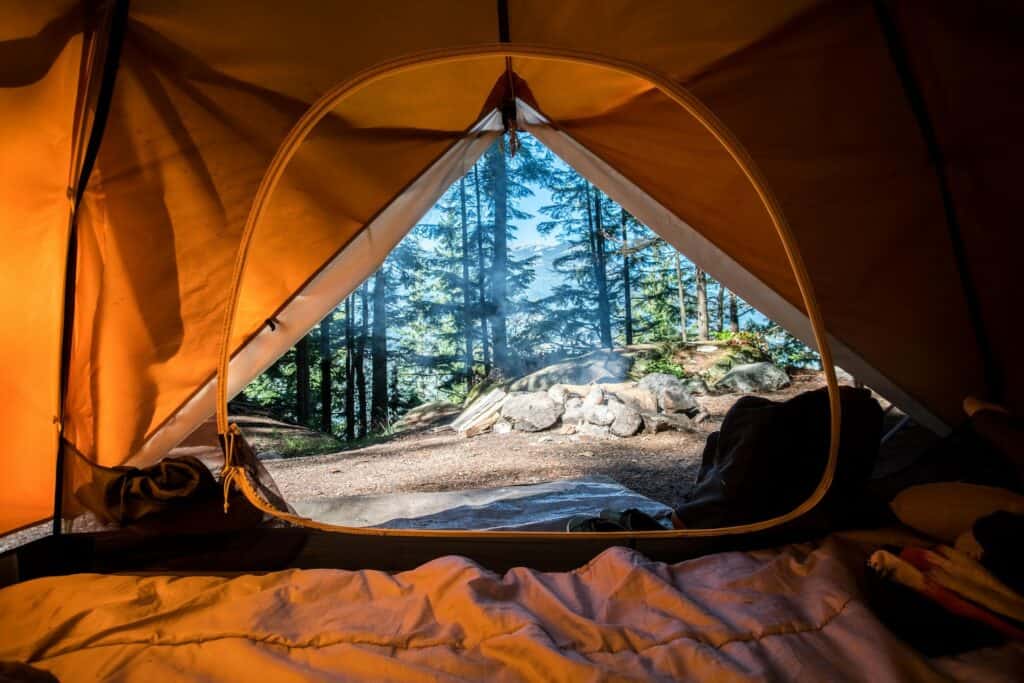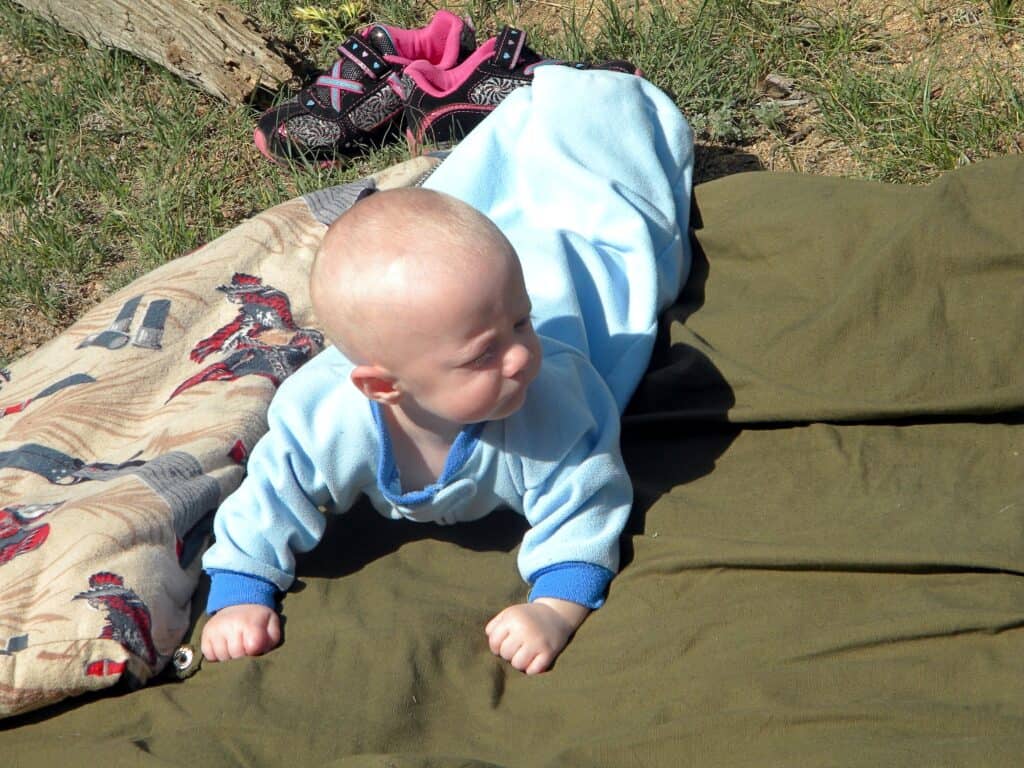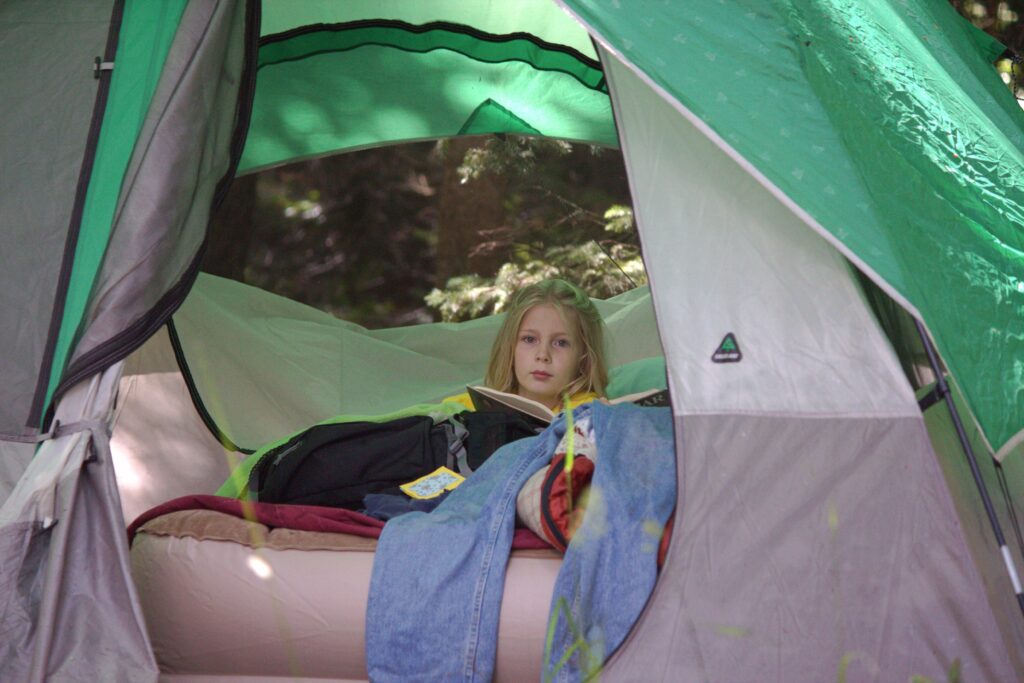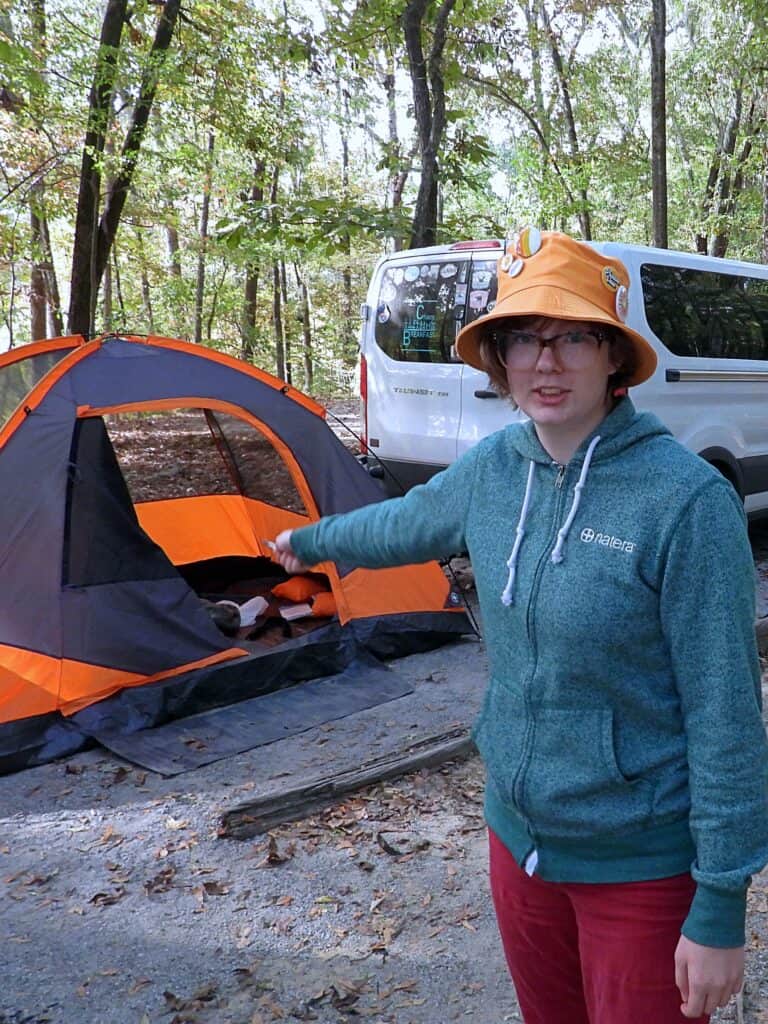Families who are new to camping often find that their kids struggle to sleep in a tent. Sleeping outside in a new place with only the thin walls of a tent between you and the outside world can make it hard for kids to relax.
You can help your child sleep in a tent by making them feel comfortable and safe. Practice at home so they can get used to the new tent, bring comfort items, stay with them while they’re falling asleep, and use white noise to block outside noises. Reading aloud or listening to audiobooks can also help them relax.
Here are more tips on helping your kids fall asleep and stay asleep in a tent:
Why Kids May Struggle to Sleep in a Tent
It’s common for people of all ages to have a hard time getting to sleep and staying asleep in new places. Tents can be tough for kids to feel comfortable in because the walls are so thin and they feel unprotected. Noise, cold, and wind can come in from outside, making kids feel nervous. In addition, they don’t have their normal comforts like their bed and blankets.
Kids can also find it strange to sleep in a tent with their whole family if they aren’t used to sleeping together. While some kids enjoy this feeling of closeness, other kids, especially tweens and teens, might feel uncomfortable at first.

How to Get Your Child to Sleep in a Tent
While it’s hard for many children to fall asleep and stay asleep in a tent, there are things parents can do to help them. For example, you can help your kids get used to sleeping in new places by letting them sleep outside of their beds at home and at the homes of family members. We often have movie night slumber parties with all the siblings sleeping on the living room floor together. They have sleepovers in each other’s rooms, as well. Sleep-overs at grandparent’s homes can also be great for helping kids be more flexible with their sleep habits.
You can also do things before and while camping specifically to help your kids relax and enjoy their night in a tent, such as practicing with the tent ahead of time and bringing things along that will help them sleep.
Practice at Home
One of the best ways to help your kids get used to sleeping in a tent is by practicing at home. You can practice by letting them try out their sleeping bags. Have a slumber party or movie night and let them sleep in their sleeping bags on the floor.
You can also try out the tent by setting it up in the backyard (or even in the house if you have room!). You could play in it, practice sleeping by having naps in there, or spend a few nights in it. This will help your kids feel comfortable in the tent and feel more confident on your camping trip. Doing a test run at home is also the best way for the adults to learn how to set up the tent and get a feel for what supplies you will need.
Bring Comfort Items
Comfort items can help kids, especially younger kids, feel safe and secure in a new environment. Even if your child isn’t attached to a lovey, having a blanket or stuffed animal from home can be comforting and fun. Our kids usually choose one or two stuffies to bring.
Let Them Help
Letting your kids help can get them excited about the adventure. If you’re new to camping, let them go shopping with you and pick out their new sleeping bag and other supplies. They can help choose other items, too, like camping chairs, a tent, and snacks.
Once you arrive at your campsite, your kids can continue to help by unloading the vehicle, helping with the tent, unrolling the sleeping bags, and organizing and arranging items inside the tent. This can help them feel excited about the night to come and help them feel ownership of the tent and other supplies.
Help Them Relax
Your kids won’t be able to fall asleep unless they can relax. Strange noises, a new location, and new bedding can all make kids anxious, excited, and worried. Help them relax for the night by following your normal bedtime routine as much as possible. Once they’re ready to lie down, many kids will feel more comfortable if they have an adult or older sibling with them, so you might have to hang out in the tent until they relax. You might need to stay until they have fallen asleep.
Try reading a bedtime story to help your kids fall asleep faster. You can also use an audiobook to distract them from their worries and fears and help mask strange sounds and activities happening outside. Campgrounds aren’t always quiet places, and even wilderness areas can be noisy at night. Our kids often fall asleep listening to audiobooks, especially in new places. Here are some of our family favorites:
Make Sure They Are Comfortable
Your kids will fall asleep faster and stay asleep better if they’re comfortable. You can help them feel comfy by making sure you have sleeping pads for your kids to cushion the ground and provide softness. You should also make sure your sleeping bags are rated for the correct temperature. You can learn more about that in this article.
Other ways to help your kids be more comfortable are by having comfortable, soft, and warm pajamas (don’t ever sleep in the day’s dirty clothes.) Make sure everyone has a bedtime snack and that their water bottles are nearby.
Insider Tip: If you have a bedwetter, it's better to use nighttime underwear than it is to restrict drinking in hopes they won't wet the bed. Not only does restricting drinking make it harder for kids to fall asleep, but it can also contribute to dehydration. Kids need more water when they're spending time outside, not less.
Help Them Feel Safe
Finally, make sure you have done everything you can to help your kids feel safe in the tent. This might include having a battery-powered night light, playing white noise, and staying with them until they fall asleep. They might also feel safer if they have one of the windows open to allow them to see out (as long as it’s not too cold, of course.)
Getting Your Baby or Toddler to Sleep in a Tent
If you are taking a baby or toddler camping, you will have needs and concerns that are different from those of families with older kids. You will need to make sure your baby is safe, warm, and stays inside his sleeping bag or blankets. You will also need to take special precautions if you plan to put him to bed early and continue your evening outside around the fire.
When you’re putting your baby or toddler to sleep in a tent, try to mimic your normal routines as much as possible. If you normally rock them to sleep, try to hold them until they fall asleep in your arms. If you lay them in their crib to fall asleep, lay them in their sleeping bag and create a crib-like feeling with blankets or pillows for walls. Better yet, bring a portable crib if it will fit in your tent. Note: Normal sleeping bags aren’t safe for babies. Learn more here.
You might need to sit with your baby until they fall asleep, even if they usually fall asleep alone. To your baby, the tent is a new place with new things to explore and new things to worry about. If you lay them down and walk away, they are likely to either get scared or find something to play with like the tent zipper or your bags of clothes.
A favorite stuffy or blanket from home can help your little one relax and feel comfortable and safe in the new environment. You can also try letting your baby or toddler fall asleep to a movie, music, or an audiobook if it seems like they’re having trouble relaxing. Read more about sleeping in a tent with babies and toddlers in this article.

Putting Your Preschooler to Bed in a Tent
Just like babies and toddlers, preschoolers will need extra reassurance and care to go to sleep in a new place. They are also wiggly and can easily escape their sleeping bags at night, and may not wake up when they get cold.
Your preschooler is likely to need the same comfortable atmosphere and attention as a baby would, but they will also be more independent and interested in all of the different things going on, both inside and outside the tent. Preschoolers are experts at finding things to distract themselves from falling asleep, and a tent is full of wonderful new things to explore. For this reason, even if your child usually falls asleep on their own, you will likely have to stay with them while they go to sleep in a tent. A preschooler is also likely to feel anxious about the new environment, and won’t want you to be too far away while they’re falling asleep.
To help your preschooler relax, try to stick to your normal bedtime routine as much as possible. For example, if you always read a bedtime story, bring a few picture books along so you can continue the tradition. You might not be able to do all your normal steps, such as taking a bath, but you should do what you can. You can even use moist wipes to have a mini-bath before crawling in the sleeping bag.
Campgrounds can be noisy, so use white noise, music, or an audiobook if needed to help muffle outside noises and keep your child relaxed. Make sure that you bring a stuffed animal or other lovey to keep your preschooler company while they fall asleep.
Helping Your Child to Sleep in a Tent: Ages 5-10
Your elementary-age child will probably be excited and look forward to the adventure of spending the night outside in a tent. They may also feel trepidation, especially as the time actually arrives to go to sleep. While the thought of camping was exciting to them, actually falling asleep in a new place can still be hard at this age.
Your older child will be less fearful of sleeping in a new spot, but will likely still experience some anxiety, especially if they are headed to bed before the adults. They might be ashamed of feeling scared, so make sure you are observant of their feelings even if they don’t want to talk about it. A stuffy or toy from home can help them feel safer and more relaxed. You can also try a movie, audiobook, or music to help them stop thinking about where they are and drift off.

Preteens and Tent Camping
Preteens are usually confident in their abilities and are less likely to feel worried or anxious about sleeping in a tent. They will likely not want to go to sleep completely alone, however. If you only have one child, you might need to stay with them while they fall asleep if they’re feeling anxious or scared. On the other hand, some kids of this age may be self-conscious about sleeping with their whole family in the same place, especially if they’ve had their own room for most of their life.
By this age, your child will likely be okay falling asleep without an adult in the tent, especially if there is more than one kiddo going to bed at once. They might even want to sleep in their own tent, which is a fun adventure for kids. Read more about letting kids sleep in their own tent here.
Make sure that you’re ready to give advice and help tweens if they have trouble going to sleep. They might be embarrassed to tell you if they’re nervous, so pay attention. Sometimes kids of this age can think themselves into an anxious feeling because they are old enough to understand some dangers, like bears, without being old enough to be logical about the actual risk. They have active imaginations and can picture scary things. Just like other ages, if they can’t relax, are too excited, or are feeling worried and anxious, try audiobooks or movies to distract them. They can also read to themselves if you have a light. I got such a cozy feeling as a child reading myself to sleep in a snuggly sleeping bag with the smell of pine trees all around.
How to Help Your Teen Sleep in a Tent
Teens are usually ready to stay up later with the adults and will feel confident about sleeping in a tent, whether it’s alone or with the family. Some teens might not enjoy the idea of sleeping outside because of bugs, the lack of electronics, or sharing a space with their family, but they aren’t likely to be anxious and afraid as long as there are other people nearby.
Many older teens might sleep better if they have their own tent or a room of their own in the main tent. While this isn’t always feasible, if your teen is reluctant to go camping because they don’t want to share a room with their whole family, it’s something to consider. Teens are usually adult-sized and will need an adult sleeping bag as well as a thicker sleeping pad compared with when they were smaller. Some teens enjoy sleeping on hard surfaces like the ground or the floor but most will probably sleep better with a sleeping pad to provide cushioning and warmth.

If your teen enjoys reading before bed, make sure they bring along a book and reading light. This can help them relax and fall asleep. Even though we generally enforce a no-electronics rule while camping (we usually camp in areas without cell service) we will sometimes make an exception at bedtime. If your teen has a hard time falling asleep in new places, consider having a few movies, music, or audiobooks downloaded ahead of time to help them relax (this works well for adults, too).
Conclusion
Camping with kids can be fulfilling and creates great childhood memories that last for lifetimes. However, for the most successful trip, plan ahead and be prepared for bedtime struggles.
Read More About Tent Camping With Kids:
How Long Should Your First Family Camping Trip Be?
Do Kids Need Sleeping Pads for Camping? How to Decide
How to Sleep in a Tent With a Baby: Tips and Tricks
Camping With Toddlers: How Do I Keep My Child in the Tent?
Is Tent Camping Safe? Tips and Tricks to Make it Safer
Camping with Kids: What Age Can You Use a Sleeping Bag?
https://trailtrompers.com/do-kids-need-sleeping-pads-for-camping-how-to-decide/




